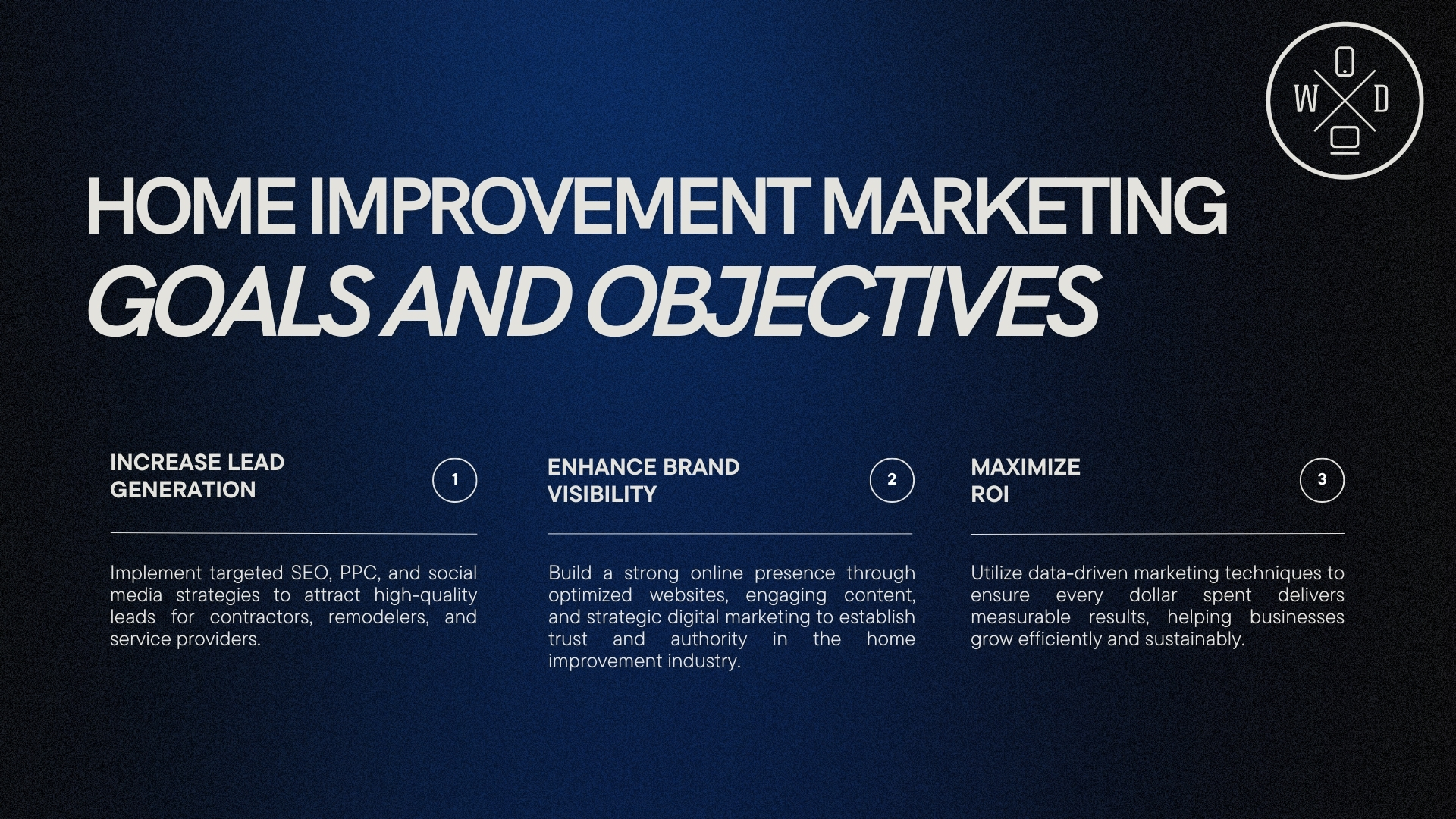Tools for the Task: Best Practices of SEO for Home Improvement Companies
Homeowners turn to search engines to find contractors, remodelers, and service providers. When they do, can they find your business? Strong SEO home improvement strategy can help your business grow or it can hold you back. But where do you start? What tools and tactics should you prioritize?
We have helped home improvement companies all across the country to reach more clients they can help. Whether you’re a local contractor, a remodeling firm, a national home services brand, or just about anyone else whose work gets their hands dirty, these strategies will help you climb search rankings and attract more qualified leads.
Why SEO Matters for Home Improvement Businesses
Before diving into tactics, it’s important to understand why SEO home improvement is so critical:
- High Purchase Intent: Homeowners searching for services like “kitchen remodeling near me” or “roof repair” are often ready to hire. Ranking for these terms means capturing high-intent traffic.
- Local Dominance: Most home improvement businesses serve specific regions. Local SEO ensures you appear in “near me” searches and Google’s Local Pack.
- Long-Term ROI: Unlike paid ads, SEO builds sustainable visibility. A well-optimized site continues generating leads without ongoing ad spend.
Now, let’s explore the key tools and strategies to maximize your SEO home improvement success.
The Foundation of Home Improvement SEO: Keyword Research
Effective SEO for home improvement companies starts with targeting the right keywords. Homeowners search with specific intent, so your keyword strategy should align with their needs.
Best Practices for Keyword Research
- Focus on Local Keywords: Include city/region names (e.g., “bathroom remodeler in Los Angeles”).
- Prioritize Buyer Intent: Target transactional keywords like “hire a plumber” or “cost of kitchen renovation.”
- Use Long-Tail Phrases: These have less competition and higher conversion potential (e.g., “best flooring options for pets”).
Tools like Google Keyword Planner, Ahrefs, and SEMrush can help identify high-value terms.
Setting Your Website Up for Conversions: On-Page SEO
Once you’ve identified keywords, the next step is optimizing your website’s pages.
Key On-Page SEO Elements
- Title Tags & Meta Descriptions: Include primary keywords naturally (e.g., “Trusted Roofing Contractor | [Your City]”).
- Header Tags (H1, H2, H3): Structure content for readability and SEO (e.g., “H1: Top Home Renovation Trends in 2024”).
- Content Quality: Publish detailed, helpful guides (e.g., “How to Choose the Right Contractor for Your Bathroom Remodel”).
- Internal Linking: Connect related pages (e.g., link a blog about “kitchen backsplash ideas” to your kitchen remodeling service page).
Take Control of Your Service Area: Local SEO
For home improvement businesses, local visibility is non-negotiable.
Local SEO Must-Dos
- Google Business Profile (GBP) Optimization:
- Claim and verify your listing.
- Use accurate NAP (Name, Address, Phone) details.
- Post updates (offers, before/after photos).
- Encourage genuine customer reviews.
- Local Citations: Ensure consistent business info across directories (Yelp, etc).
- Service Area Pages: Create location-specific pages (e.g., “Kitchen Remodeling in [City]”).
Building a Way for Search Engines to Find You: Technical SEO
A technically sound website improves rankings and user experience.
Technical SEO Checklist
- Mobile Optimization: Most searches come from mobile devices—ensure fast loading and responsive design.
- Site Speed: Pros can fix performance issues.
- Structured Data: Implement schema markup for services, reviews, and FAQs.
- Fix Broken Links: Use the right tools to detect 404 errors.
Building Your Authority and Providing Value: Content Marketing
High-quality content establishes trust and attracts organic traffic.
Content Ideas for Home Improvement SEO
- How-To Guides: “Step-by-Step Guide to Bathroom Tile Installation.”
- Cost Breakdowns: “Average Cost of a Deck Addition.”
- Trend Reports: “Top Home Design Trends This Year.”
- Customer FAQs: “What to Ask Before Hiring a General Contractor.”
Publishing regularly (blogs, videos, infographics) keeps your site fresh and engaging.
Using What You Already Have: Reputation Management
Customer reviews impact rankings and trust. If you’ve got satisfied customers, they can be a powerful tool for building your reputation.
How to Encourage Reviews
- Ask Satisfied Clients: Send follow-up emails with review links.
- Respond to All Reviews: Show engagement (even negative ones).
- Display Reviews on Site: Embed Google reviews to build social proof.
Changing Plans As Circumstances Change: Tracking & Adjusting Your Strategy
SEO isn’t a “set it and forget it” effort. Regular monitoring ensures continuous improvement.
Here at Website Depot, we provide our clients with reports. That way, they can see what worked, what could improve, and then we make it happen.

Putting All Your SEO Home Improvement Together
A winning SEO home improvement strategy combines keyword research, on-page optimizations, local SEO, technical fixes, content marketing, and reputation management. By implementing these best practices, home improvement businesses can improve visibility, attract more leads, and stay ahead of competitors.
At Website Depot, we specialize in helping home improvement companies optimize their digital presence. If you’re ready to take your SEO to the next level, our team can tailor a strategy that fits your unique business needs.
FAQs: SEO for Home Improvement Companies
1. Why is SEO important for home improvement businesses?
Homeowners actively search for services like “kitchen remodeling near me” or “roof repair,” often ready to hire. SEO helps your business:
- Capture high-intent leads.
- Dominate local search results.
- Build long-term visibility without ongoing ad costs.
2. What keywords should home improvement companies target?
Focus on:
- Local keywords (e.g., “bathroom remodeler in [City]”).
- Buyer-intent terms (e.g., “cost of kitchen renovation”).
- Long-tail phrases (e.g., “best flooring for pets”).
Tools like Google Keyword Planner and SEMrush can help.
3. How can I improve my local SEO?
Key steps include:
- Optimizing your Google Business Profile (accurate info, posts, reviews).
- Building local citations.
- Creating service-area pages (e.g., “Roofing in [City]”).
4. What technical SEO fixes should I prioritize?
Ensure your website:
- Loads quickly.
- Is mobile-friendly.
- Has schema markup for services and reviews.
- Fixes broken links.
5. How do reviews impact SEO?
Positive reviews:
- Boost local rankings.
- Build trust with potential customers.
Encourage reviews by asking happy clients and responding to all feedback.
Need help with SEO for home improvement? Website Depot specializes in boosting visibility for contractors and remodelers. Let’s grow your business!


